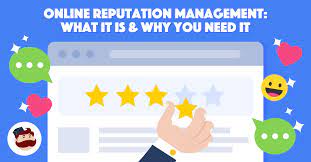Good reputations don’t just happen – they must be carefully crafted and managed. In the digital age, your online reputation is more important than ever before. An online reputation manager can help you build a positive presence, engage with potential customers, and protect yourself from negative reviews or comments that could damage your business. This article will explore the many benefits of having an online reputation manager and provide strategies for effective online reputation management online. So if you’re looking to boost your brand’s visibility and bring in more customers, read on for tips on how to take control of your online reputation.
Table of Contents
ToggleWhat is a Reputation Manager?
A reputation manager is an individual or company that specializes in managing the online digital reputation of a business or person. They use various strategies to create, monitor and protect a brand’s public image and help maintain a good reputation for their client. Reputation managers work to ensure customers trust the company by promoting positive content about it on search engines, social media channels and other websites. They can also be proactive in responding to negative comments, reviews and complaints quickly in order to minimize any damage to the company’s reputation.
Benefits of Having an Online Reputation Manager
Having an online reputation manager is essential for businesses that want to remain competitive and build a strong relationship with customers. By investing in a reputation manager, companies can benefit from:
• Increased visibility on search engines and social media channels – Reputation managers will help promote positive content about your business, ensuring it’s seen by more people.
• Improved customer trust – An online reputation manager will respond quickly to any negative reviews or complaints, helping to maintain customer trust.
• Increased brand loyalty – Positive content about your business will lead to more loyal customers who are more likely to return and recommend your services.
• Enhanced business performance – A good public image leads to increased sales, as customers are likely to choose a business they trust over one that has a bad reputation.
In short, an online reputation manager can be the difference between success and failure for your business. They’ll not only help protect and enhance your company’s public image but also ensure it remains competitive in today’s ever-changing digital landscape.
Understanding Your Online Reputation
Having a good online reputation is essential in today’s digital world. Understanding what people are saying about your business—positive or negative—is the key to success. A great way to do this is by investing in an online reputation manager. An online reputation manager will help you monitor and respond to reviews, comments, and complaints across multiple channels, including search engines and social media sites. This can be invaluable in helping you identify areas of improvement or where customers may be experiencing dissatisfaction with your product or services.
If you want to develop incisive reputational strategies, you will need a Data and Reputation Specialist who extrapolates the meaning hidden behind cold numbers and converts it into successful actions.
External Link: https://baggioandrea.com/
Assessing Your Current Online Presence
Assessing your current online presence is essential to ensure you are taking full advantage of the digital landscape and have a strong online reputation. Start by searching for your business name in popular search engines and social media sites to get an understanding of what people are saying about you. Pay special attention to customer reviews and comments, as they can be invaluable in helping you identify areas of improvement or where customers may be having a negative experience.
Identifying Potential Customers
Identifying potential customers is an important step in any marketing strategy. There are a variety of ways to identify potential customers and it’s important to think outside the box when doing so. Start by looking at who your current customers are, what their interests and needs are, and how you can use that information to target a similar demographic. Additionally, research popular industry blogs and forums to see what topics people are discussing and how they might be relevant to your business.
Analyzing Negative Reviews and Comments
Negative reviews and comments can be damaging to a business’s reputation, but they can also be useful. Analyzing negative feedback provides valuable insight into what customers are unhappy about, which can help you identify areas for improvement and make necessary changes. When analyzing negative reviews and comments, look for patterns in the type of feedback and determine what could have caused it. Consider how you can use this data to refine your product or service offering and enhance customer satisfaction.
Improve Click-through Rate:Google returns star ratings and review counts in their local search results. Searchers are more likely to click through to a business with a higher star rating and review count. Interestingly, a business gets 25% more clicks from Google’s Local Pack by going from a 3-star rating to a 5-star rating. Read more on thishere.
External Link: https://www.brightlocal.com/research/review-search-click-through-study/
Strategies for Managing Your Online Reputation
Businesses must pay close attention to their online reputation in order to remain competitive and successful. There are several strategies for managing your online reputation that can help you maintain a positive image and protect your business from negative reviews or comments. One strategy is to respond promptly and professionally to all customer feedback, both positive and negative. This will show customers that you value their opinion and are committed to addressing any issues they may have.
Creating Positive Content to Counteract Negative Reviews and Comments
Creating positive content to counteract negative reviews and comments is an effective way of managing your online reputation. Creating content such as blog posts, videos, webinars or podcasts that are both informative and entertaining can help to build trust with customers, showcase your expertise in the field, and ultimately create a positive image for your company. Not only will this help to counter any potential negative publicity, it will also attract new customers who may be unfamiliar with your brand.
Utilizing Social Media Platforms to Promote Positive Reviews and Comments
Social media platforms can be a powerful tool for managing your online reputation. Utilizing these platforms allows you to engage directly with customers, promote positive reviews and comments, and showcase your expertise in the field. By creating content that is both informative and entertaining, businesses can attract new customers who may be unfamiliar with their brand. Additionally, many social media platforms allow you to respond directly to customer feedback and use it as an opportunity to further promote your business.
Leveraging Influencer Marketing for Brand Promotion
Leveraging influencer marketing is an effective way for businesses to promote their brand and reach a large audience. Influencers have the power to influence potential customers through their followers, who may be interested in the products or services they are promoting. By partnering with influencers, businesses can gain access to their followers and build trust with them, which will help increase conversion rates. Additionally, influencers can provide valuable feedback on the latest industry trends and insights that can help businesses stay up to date and competitive.
Optimizing Your Search Engine Results with Business Listings and Personal Branding
Optimizing your search engine results with business listings and personal branding can help you increase visibility for your brand online. Business listing sites such as Google My Business and Yelp are invaluable resources that can help potential customers find your business quickly and easily. Additionally, creating a presence on social media networks such as Facebook, Twitter and Instagram can also help bolster your chances of appearing higher up in organic search results. When optimizing your search engine results, it is important to ensure that all of the information on business listings is accurate and up-to-date. Creating content that is relevant to users’ queries can also help boost rankings in searches.
Building Customer Experience Through Online Communication Channels
Building customer experience through online communication channels is integral for any business. Utilizing platforms such as email, chatbot, and social media can help build relationships and increase customer satisfaction. For example, an email newsletter can keep customers updated on the latest news and deals. Chatbots can provide instant answers to frequently asked questions and even help customers purchase items. Social media platforms such as Facebook, Twitter, Instagram and YouTube are great ways to engage with customers and create a community around your brand.
Tools for Effective Reputation Management Online
Reputation management online is essential for any business that wants to stay successful. To ensure success, businesses must take advantage of the right tools to effectively manage their online reputation. The right tool should automate processes, track performance and provide analytics. Automation tools like AI-driven chatbots can answer customer questions quickly and accurately while other software solutions can help streamline communications with customers and monitor customer sentiment.
If a brand develops a reputation that isn’t connecting with its target customers, businesses have the chance to rebrand. For example, Airbnb rebranded in 2014 to help shift perceptions of the brand from tech-centric to people-centric.
External Link: https://www.thebrandingjournal.com/2014/07/airbnbs-consistent-rebrand-focuses-sense-belonging-community/
Cost Considerations of Hiring a Reputation Manager Average Salary
The cost of hiring a reputation manager can vary widely depending on the experience level and size of the company. An experienced reputation manager typically earns an average salary of $50,000 to $100,000 per year. This figure is significantly higher than what a business would pay for an entry-level employee or an automated solution. However, businesses should also consider the cost benefits when using an automated solution. Automated solutions are usually less expensive than hiring a dedicated manager and they can help businesses save time and money by automating tasks such as customer service, online reviews and online presence monitoring.
Conclusion
In conclusion, businesses should carefully consider the cost of hiring a reputation manager versus the cost benefits of using an automated solution. While experienced reputation managers can offer valuable skills and expertise, they typically come with a higher price tag than entry-level employees or automated solutions. Automated solutions offer scalability and more efficient management of online presence and reviews at a lower cost.








